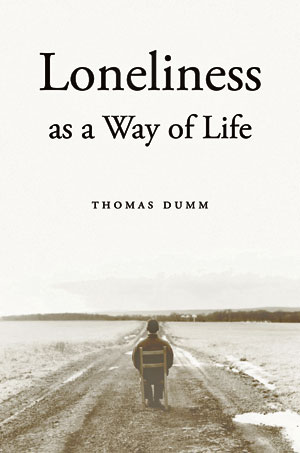
The title is an almost absurdly clear description of the book, but the truth is, until my editor suggested that title to me, I wasn’t quite sure that what I was trying to grasp was, in fact, a way of life. Loneliness as a Way of Life looks at three elements of the path of loneliness in modern life – how we buy and sell ourselves, which is to say, how we are possessed by our possessions, how we love, and how we grieve. I interweave philosophy, literature, and recollections of my own past experiences to try to understand more fully what it means to be lonely, what the history of modern loneliness is about. I begin to set the scene for the book by writing about the tragedy of King Lear, how Cordelia and her dad, through some terrible misrecognitions of each other, each end up in a lonely place that we might recognize as being akin to our own modern place. I argue that a lot of loneliness has to do with the problem of the “missing mother.” And that thread, the problem of how we are unable to come to terms with that metaphorical (and sometimes literal) loss of mother, has, I argue, set the terms of our modern condition.
In successive chapters, I use new readings of some canonical works, primarily from American literature, to connect loneliness to a better understanding of the politics of experience. I am very interested in the politics of everyday life, and from a variety of angles I try to illuminate these different aspects of lonely existence. It adds up to an argument that loneliness is an element of the human condition that decidedly shapes the horizon of our possibilities, politically, socially, and existentially.
Because so much of this book is personal, I ask my readers to try to bring more of themselves to the reading of this book than they might otherwise do. I ask this in part as a plea, but also as a warning. This is not a happy book. In fact, at a roundtable concerning it recently in Boston, several of the commentators noted that they would be sitting and taking notes on the book in coffee bars, and suddenly find that they were crying. I took that as a compliment. I tried to make this book have emotional, as well as intellectual, impact. Indeed, part of the point is to say that those two elements of how we comprehend the world are closer to each other than we usually appreciate.
“Too much writing, even writing about the self, is simply filled with self-help nostrums. Those books condescend to their readers. I ask my readers to descend to meet me.”
I first approached this study as an intellectual history of individualism. From early on in my life as a political theorist, I have been interested in those large forces that shape how we become who we are, what our relation to freedom is, what it means to live in a world shaped by capitalism and liberalism, or in the words of the political theorist C.B. MacPherson, to have our possibilities shaped by possessive individualism. But also, when I first decided to go to grad school, I became acquainted with the work of Michel Foucault, and his work presented yet another dimension of how we become who we are. Especially his book, Discipline and Punish – a work that many have misunderstood, I think – helped shape my ongoing concern with individualism. My first book, Democracy and Punishment (1987) explored the disciplinary dimension of American individualism by looking at our invention of the penitentiary. In subsequent books, aside from a study of Foucault for a series on philosophers (Michel Foucault and the Politics of Freedom, 1996) I have become more and more interested in the interplay of culture and power, writing a book about representative figures in contemporary political culture (united states, 1994) and helping to found a journal, Theory&Event – I became its first editor – that encourages thinkers to directly write about the contemporary world.
But as I began work on this book, on the heels of the publication of my last book in 1999 (A Politics of the Ordinary), some large and sad events in my own life made the project take on a new urgency. On the first day of 2001, my mother died. Like many, I had a complicated and sometimes difficult relationship with my mom, and while I was a peace with her when she died, her death sparked new reflections on what she meant to me as she lived and how I was to negotiate her ghostly presence in my life after she was gone. During this same period, my wife was diagnosed with an incurable form of lung cancer, and she died, after a protracted battle with the disease, in the autumn of 2004, leaving me alone to raise our two children. These events deepened my sense of loneliness, sharpened my thought, and made me reconsider how to approach the subject.
Loneliness as a Way of Life, to the extent that it articulates an argument rather than embodies one, suggests that loneliness is “the experience of the pathos of disappearance.” I suggest, following Thoreau and Stanley Cavell, that we are in danger of living ghostly lives, and that that ghostliness is deeply intertwined with what it means to be lonely. But rather than produce yet another sociological study, I try something different. I cover what may be considered as familiar terrain, but I do so in a manner that is different from what has come before. For example, in chapter three, “Loving,” I discuss the loneliness of family life by juxtaposing John Locke’s theory of parental authority with a discussion of the strains on my marriage that having two children in a family that strove for gender equality produced. Or, I contrast the fragmented family story in Wim Wenders devastating film, Paris, Texas, with a story from my own troubled childhood, concerning myself and my own mother. Using literature, film, and plays to illustrate political theory is not new, of course. But too often it is done without attending to how such works touch us, how their affective force leads us to rethink moments in our own lives. In that sense, I think there is something fresh, if not totally new, in my approach.
So the book presents a challenge across several dimensions: for academics, it demands that they take seriously the claims of personal experience and the everyday. In that sense, this book is a rebuke to those, like some contemporary followers of Hannah Arendt, who think that there can be, and needs to be a sharp distinction between public freedom and private necessity. That idea is simply unviable in this day and age. It also presents another challenge to academic writers more generally, in that I was encouraged by my editor to find my own voice in this book, to write with more directness and clarity, while sustaining the intellectual rigor expected by Harvard University Press. Squaring that circle has become more and more difficult over the past several decades, as the academy has become more and more specialized, and as the public sphere has become more and more dumbed down. I suspect I’ve not been completely successful, but I’m nonetheless happy to have made the effort.
The book’s epilogue is entitled “Writing.” It is short, about seven pages, but it tells a story about a trip I made to Ethiopia with my older brother, right before I started to write the book itself. He wanted me to go with him in order to shake away the melancholy that had enveloped me in the two years since the death of my wife. That trip helped me tremendously, but not in the way I thought it would. Instead, it served to illuminate what a path through loneliness might be about, when we learn not to fight it, to try to overcome it, but to dwell with it, to appreciate its other elements. I contrast my trip, which occurred during a period of political violence in Addis Ababa, with the admonition in Walden to practice what Thoreau called “home cosmography,” which I take to mean an exploration of how to be at home in the cosmos by writing about it. For me, the epilogue ties things up in a way that isn’t too neat, but which nonetheless encourages further reflection by all of us on how we might move on in the face of loss. And again, like my editor’s intervention with the title, this epilogue is there not because of any special insight on my part, but because one of the readers of the manuscript suggested that writing about writing might be a good way to show why and how the book has been written in such a way.
“I was encouraged by my editor to find my own voice in this book, to write with more directness and clarity, while sustaining the intellectual rigor expected by Harvard University Press. Squaring that circle has become more and more difficult over the past several decades, as the academy has become more and more specialized, and as the public sphere has become more and more dumbed down.”
My greatest hope for Loneliness as a Way of Life is that it helps someone who reads it to recognize his or her experience, not as being the same as mine, but as itself being something worth taking seriously. Too much writing, even writing about the self, is simply filled with self-help nostrums. Those books condescend to their readers. I ask my readers to descend to meet me. I take seriously both Emerson, who believed that a true self always descends from a higher place to be with others, and Socrates, who first used the idea of descending to the marketplace as a gesture through which democratic conversation might occur. This book may be too ambitious, maybe too dense, it certainly is dark, but it sure doesn’t condescend to its readers. It doesn’t explicitly offer hope, but it does, I hope, illustrate a certain kind of turn in thinking and experiencing, a kind of writing of the self, that my readers may in turn be able to see as worth thinking about and trying to do.


Thomas Dumm is Professor of Political Science at Amherst College. Aside from Loneliness as a Way of Life, he is the author of four other books, and co-editor, with Frederick Dolan, of Rhetorical Republic (1993). He co-founded and served as first co-editor of the journal of contemporary political theory Theory & Event. He was awarded a John Simon Guggenheim Foundation fellowship in 2001.